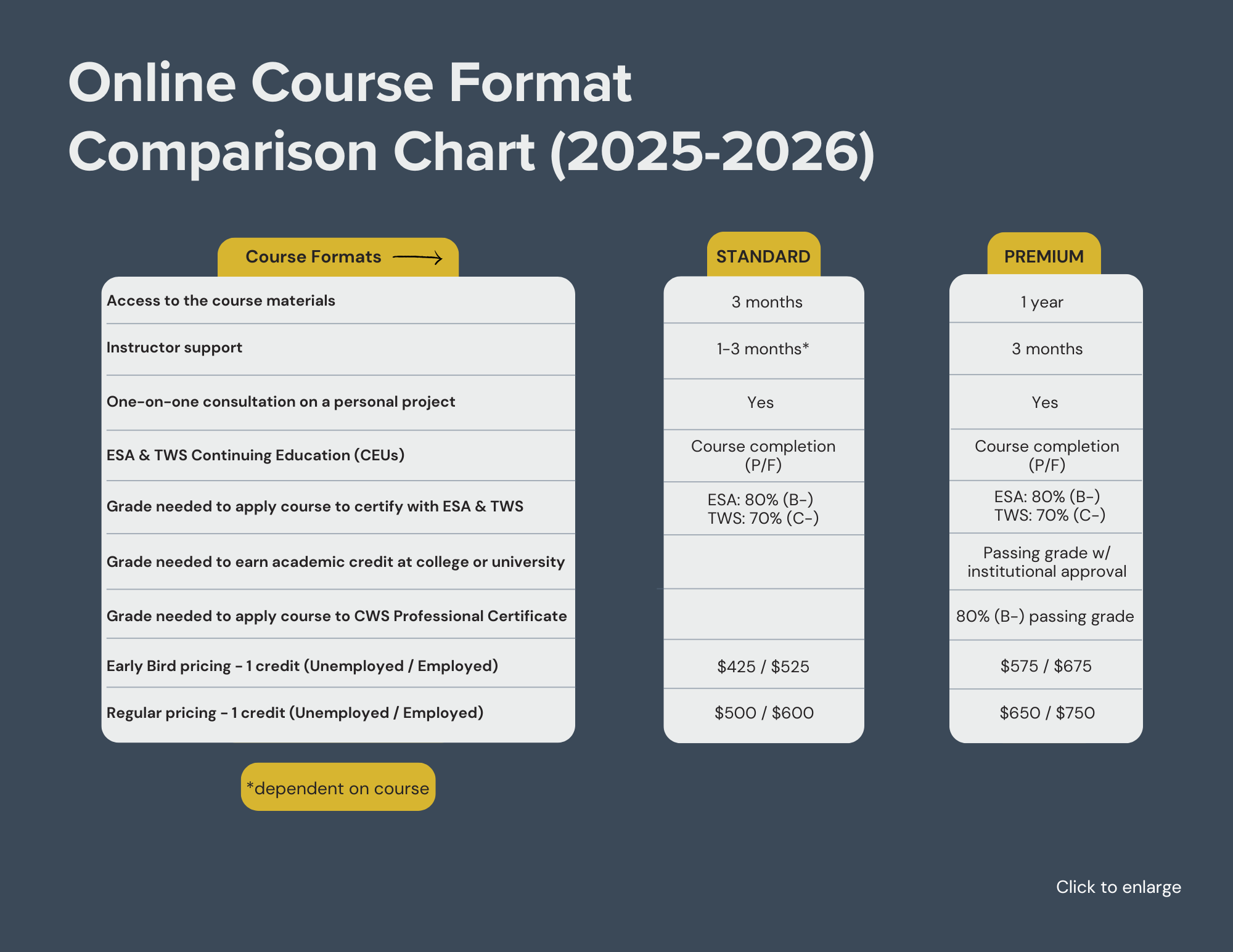-
Effective project management is crucial in research, conservation, community outreach, and other endeavors in the biological sciences. In this interactive course, you will build skills and knowledge that will help you run projects more efficiently and strengthen your ability to clearly explain project plans to various audiences. We will examine the stages of the project life cycle focusing on best practices for each stage as we cover topics including planning processes, management tools and strategies, and evaluation metrics. We will also consider the human elements of projects, including navigating team dynamics and coordinating with external collaborators and stakeholders. The course will comprise engaging pre-recorded lectures, interactive discussions, and activities where you will apply your learning to real projects on which you are working.
-
Summer: July 7 – September 21, 2025
*Early bird saves $75
Early bird ends June 7
-
Module 1: Building a foundation in project management
Learning Objective: To understand core concepts in project management.
Lecture 1: Course overview/intro to project management
Lecture 2: The project life cycle
Lecture 3: Roles and responsibilities
Learning Outcomes:
Define key terms in project management
Describe the stages of the project life cycle
Identify roles and responsibilities for team members
Define a project’s success
Module 2: Defining a project
Learning Objective: To understand internal and external factors affecting projects and use that knowledge to develop a clearly defined project.
Lecture 4: Project scope and constraints
Lecture 5: SWOT analyses and logic models
Lecture 6: Project rules and assessment metrics
Lecture 7: Stakeholder analysis
Learning Outcomes:
Develop statements of project scope
Identify and evaluate project constraints
Perform SWOT analyses and interpret their results
Develop and apply logic models and project rules
Evaluate the roles of various stakeholders
Module 3: Project planning
Learning Objective: To understand tools and strategies for planning a project and efficiently managing resources.
Lecture 7: Breaking work into objectives, goals, and tasks
Lecture 8: Risk management
Lecture 9: Time management
Lecture 10: Budgets
Learning Outcomes:
Develop a project plan, including identifying goals, objectives, and tasks
Identify and evaluate risks to the project
Develop and implement time management strategies
Estimate budgets
Identify and implement project management tools/technology
Module 4: Navigating team dynamics
Learning Objective: To learn strategies for managing personnel.
Lecture 12: Team science and effective communication
Lecture 13: Project leadership
Lecture 14: Working with external partners
Learning Outcomes:
Assess team dynamics and implement strategies for maintaining motivation
Develop and implement effective communication strategies
Identify and evaluate leadership styles
Evaluate the role of external partners and their associated challenges and opportunities
Module 5: Project execution and evaluation
Objective: To learn strategies for maintaining project progress and coping with common challenges.
Lecture 15: Measuring progress and performance
Lecture 16: Scope creep and other challenges
Outcomes:
Develop and implement metrics for assessing project progress and team performance
Develop and evaluate project reports
Identify and mitigate project challenges, including scope creep
Module 6: Project closure
Objective: To understand the key steps in closing out a project, ways of sharing results, and how to leverage lessons learned.
Lecture 17: Final reporting, archiving, and communicating results
Lecture 18: Examining lessons learned
Outcomes:
Develop and implement a checklist for project closure
Identify and select channels for communicating results
Develop effective communication products
Develop a plan for archiving project materials
Evaluate the overall project life cycle to identify lessons learned
COURSE OPTIONS & INFORMATION (Review chart above, then click below)
-
FORMAT:
3 months of access to course materials as you work at your own pace
Get instructor support for the 3-month term via email, discussion threads, group meetings, and one-on-one appointments
After working through the course materials, set up an optional meeting with the instructor to discuss your own personal project from work or school
CONTINUING EDUCATION:
16 CEUs with The Wildlife Society
CERTIFICATIONS:
Earn 1 credit toward certification as an Associate/Certified Wildlife Biologist® (at any level) with The Wildlife Society
-
FORMAT:
12 months of access to course materials as you work at your own pace
Get instructor support for the 3-month term via email, discussion threads, group meetings, and one-on-one appointments
After working through the course materials, set up an optional meeting with the instructor to discuss your own personal project from work or school
CONTINUING EDUCATION:
16 CEUs with The Wildlife Society
Go to our Continuing Education Page for more details
CERTIFICATIONS:
Earn 1 credit toward a Professional Certificate in Conservation Planning with CWS
ACADEMIC CREDIT:
Earn 1 academic credit (go to our Academic Credit Page for details)
Earn an additional 1-2 academic credits with an Applied Project
INSTRUCTOR
SCHOLARSHIPS
Full scholarships are available to participants from countries designated as “lower income” and “lower middle income” in the World Bank List of Economies. Please see our CWS World Scholars Program page for details.
CANCELLATION POLICY
Cancellations 30 days or more before the start date are not subject to cancellation fees. Cancellations <30 days before the start date are subject to a 50% cancellation fee. No refunds once the course begins.




